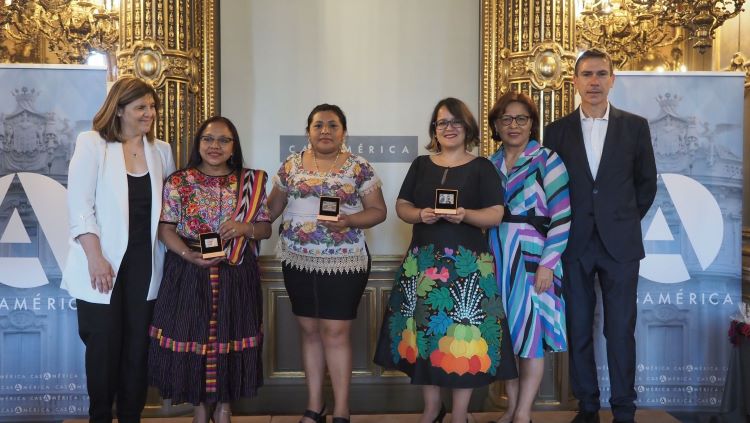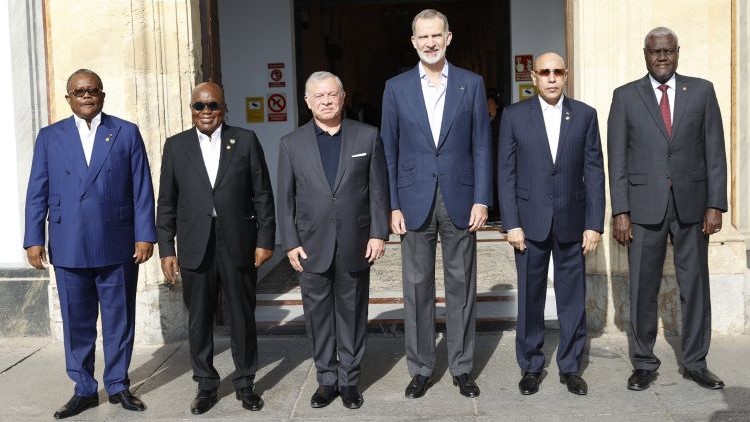Eduardo González
The State Secretary for International Cooperation, Pilar Cancela, took advantage of the Bartolomé de las Casas Awards ceremony yesterday to announce that the sixth Master Plan will be ready “very soon, within a month and a half”, and will include Spain’s commitment “with the indigenous peoples of Latin America and the Caribbean”.
Cancela presided yesterday at the headquarters of the Casa de América in Madrid the ceremony of delivery of the three commemorative medals of the recipients of the Bartolomé de las Casas Award in the editions of the years 2022 and 2018. The ex-aequo winners of the XXIX edition of 2022 were the Centro Alternativo para el Desarrollo Integral Indígena A.C. (CADIN) of Mexico (represented in Madrid by María Liria Fabiola May Canul, a Mayan leader from Yucatan) and the Centro de Investigación Diseño Artesanal y Comercialización Cooperativa (CIDAC) of Bolivia (represented by Paula Saldaña Fernández). Apart from that, the winner of the XXVI edition of 2018 (which could not be delivered at the time) was Alma Gilda López Mejía, a Mayan Quiché leader from Guatemala.
These last awards, according to Casa de América and the State Secretary, have been granted to indigenous organizations or women leaders with the purpose of “highlighting the important work carried out by these institutions in defense of indigenous peoples, women’s rights and against all violence.” In addition, it is also intended to “place special emphasis on their role as caretakers of the land and sustainability, culture and the life of their communities, especially from an intersectional vision as women and indigenous people, in ethnic and cultural diversity and from the rural environment”.
This event closes a cycle of twenty-nine editions of the award. In the new stage, the Spanish Agency for International Development Cooperation (AECID) will replace the Directorate General of Policies for Sustainable Development (DGPOLDES) in the management of this award and in the call for the XXX edition, corresponding to 2023.
During yesterday’s presentation (attended by the ambassadors of Argentina, Ricardo Alfonsín; Bolivia, Nardi Suxo; Chile, Javier Velasco Villegas; and Nicaragua, Maurizio Carlo Alberto Gelli), the general director of Casa de America, Enrique Ojeda, stressed the importance of a prize that “bears the emblematic name of Bartolomé de las Casas” and that “seeks understanding and harmony with the indigenous peoples of America, the recognition of their struggle, defense, protection of their rights and respect for their values”.
“America cannot be understood without its original indigenous peoples,” he continued. “Throughout generations, these peoples have known how to share their worldviews, their cultural wealth, their languages and their knowledge” and, therefore, “each call for this award is a new opportunity to highlight the work of these associations that day by day, beyond obtaining prizes or awards, defend the rights of indigenous peoples,” he concluded.
Pilar Cancela
For her part, Pilar Cancela assured that “the recognition of the rights and the work for the progress of indigenous peoples became, right from the beginning of Spanish Cooperation, a sign of identity”. “After a five-year consultation with indigenous organizations in Latin America, the second strategy for Spanish cooperation with indigenous peoples was approved in 2007,” she recalled.
Likewise, she continued, “in the sixth Master Plan, which we are working on now and I believe we have it ready to implement (hopefully very soon, in about a month and a half), there is this commitment of Spanish Cooperation with indigenous peoples, as it could not be otherwise”.
Spanish Cooperation is still governed by the V Master Plan corresponding to the period 2018-2021. The External Action Strategy 2021-2024, adopted in April 2021 by the Ministry of Foreign Affairs, includes among its objectives “the preparation and monitoring of the VI Master Plan for Spanish Cooperation for the period 2022-2025”. The approval of the Master Plan corresponds to the Council of Ministers, which has only four meetings left before the early general elections on July 23rd and, therefore, before the Executive goes into office for an indefinite period.
The State Secretary also highlighted, within the framework of Spanish Cooperation’s gender strategy, “the contribution that indigenous women can make, that they have made, their ancestral knowledge, their demands, as a fundamental element that supports our own cooperation”. An example of this, she said, is the fight against climate change. “For you it is not a fad, it is something you have always been doing,” she said. “What we now call environmental sustainability, you have always called respect for the Earth,” she added.






